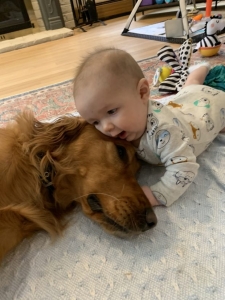It’s no act, the ability to show empathy and love is the true power of dogs
The Oscar nominations are in, which means most evenings, my dog Sueshi and I are snuggled on the couch, my husband Pierce is settled into his comfy chair, and we are watching the movies.
Given the title, I thought my pick for Best Picture would be “The Power of the Dog.” As it turns out, the movie has absolutely nothing to do with dogs. Of the seven contenders for Best Picture I’ve seen, “CODA” is my clear favorite. I loved this film!
Spoiler alert: “CODA” is the story of Ruby, a teenage child of deaf adults who has a passion for singing. Ruby is the only hearing member of her family. Her mother, father and brother are deaf. When Ruby enrolls in the high school chorus, her mom thinks it may be a form of adolescent rebellion. She signs, “If I was blind, would you want to paint?”

Dia DuVernet, president and CEO of the Pasadena Humane Society and SPCA, and her dog Sueshi.
Those of us watching the movie, who can hear Ruby practice her singing, know she has an amazing set of pipes. Eventually, her family comes to understand the power of Ruby’s voice by witnessing the joy, tears and awe-inspired by her performance at the school recital. The family’s emotional connection with the audience, and dawning appreciation of Ruby’s talent, are made obvious when the movie goes silent during the performance so that those of us who can hear are better able to perceive the experience of those who cannot.
I was personally overcome by watching the family’s empathy unfold (yes, I cried). At the same time, my empathy for those who are deaf grew by leaps and bounds.
The movie reminded me of what I think is the true power of the dog — the ability to show empathy and love.
Anyone who has ever loved a dog does not doubt the ability of “man’s best friend” to understand and share our feelings, regardless of our gender. Sueshi comforts me when I am sad, she rests by my side when I am sick and she twirls with enthusiasm when I am excited.
For those of you who may be skeptical about what I see as canines’ emotional superpower, research has shown that dogs and people have a similar response to hearing a human baby cry. For both people and dogs, cortisol levels, an indicator of stress, spike in response to the sound of a baby crying, while the sounds of a baby babbling, or unpleasant radio static do not alter cortisol levels.

Best friends Henry, left, and Harrison Logan Hardy, sharing a happy moment together.
I’ve done my own personal research into this. My niece just had a baby, and her dogs Henry and Myles are completely stressed when Harrison cries. Henry especially is Harrison’s BFF. (Myles is fond of stealing Harrison’s toys.)
Dogs’ ability to sense and understand people’s emotions has been put to use in many ways to benefit humans, including helping veterans combating Post Traumatic Stress Disorder. PTSD service dogs are trained to detect a veteran’s escalating negative emotions and distress. Dogs can prevent or interrupt anxiety and panic attacks by placing a paw on a foot, a head on a lap, or both paws on their human’s shoulders. Dogs can even detect and interrupt nightmares.
While some people might argue that no animal shows more love or empathy to humans than dogs, research has shown that cats, birds and other pets serve as best friends to many people with long-term mental illness and may be a critical component to their recovery and mental stability.
So, in recognition of the power of pets to enrich our lives, and in honor of “Love Your Pet Day” on February 20, I’m planning something extra special as a way of thanking our dog Sueshi for all the love and emotional support she has given my family and me. Even though she won’t be able to tell me with words how happy she is to receive her special treat, I will know how she feels by the wag of her tail.
Dia DuVernet is president and CEO of Pasadena Humane.
This blog post originally appeared as a column in the Pasadena Star-News on February 18, 2022.


